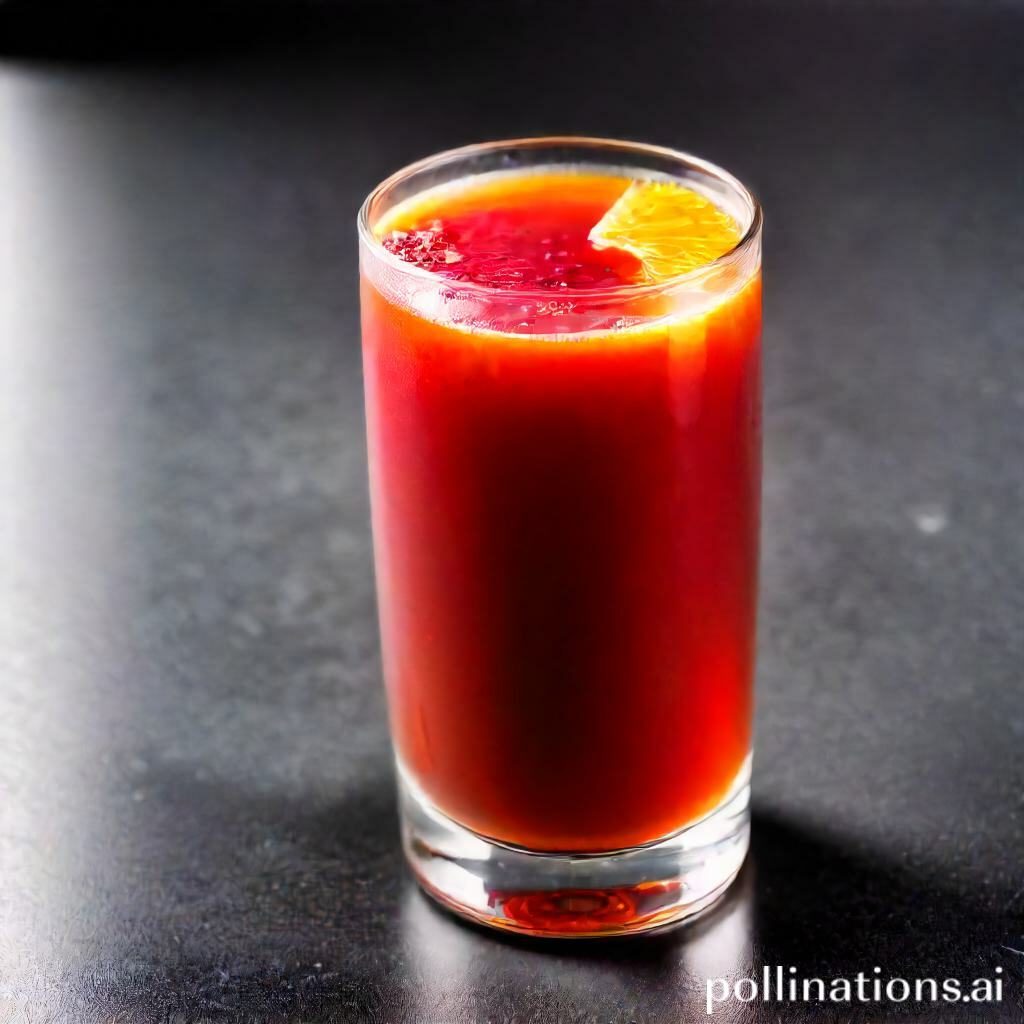Welcome to the captivating realm of fruit juice concentrate. Understanding the intricacies of this remarkable substance is key, and in this article, we will explore its production process, diverse types, and wide-ranging applications. Delving into the benefits it offers and potential drawbacks to be mindful of, we invite you to join us on an enlightening expedition. So, let us embark on this enthralling journey and uncover the secrets of fruit juice concentrate.
In this article, we will delve into the captivating world of fruit juice concentrate. We will explore its production process, diverse types, and wide-ranging applications. Additionally, we will discuss the benefits it offers and potential drawbacks to be mindful of. Join us on this enlightening expedition as we uncover the secrets of fruit juice concentrate.
The Production Process of Fruit Juice Concentrate
A. Extraction of Juice from Fruits
To obtain fruit juice concentrate, the first step is the extraction of juice from fruits. This can be done using mechanical extraction methods or enzymatic extraction methods. Mechanical extraction involves crushing or pressing the fruits to extract the juice. Enzymatic extraction utilizes enzymes to break down the fruit cells and release the juice.
B. Removal of Water through Evaporation
Once the juice is extracted, the next step is to remove the water content. This is achieved through evaporation. Evaporators are used to heat the juice, causing the water to evaporate and leaving behind concentrated juice. Multiple-effect evaporators are commonly used to maximize efficiency and reduce energy consumption.
C. Concentration Methods
Various concentration methods are used in the production of fruit juice concentrate. Freezing is one method where the juice is frozen, and the ice crystals are separated from the concentrated juice. Vacuum concentration involves applying vacuum pressure to lower the boiling point of the juice, facilitating the removal of water. Osmosis is another method where the juice is passed through a semipermeable membrane to remove water molecules.
D. Packaging and Storage
After the concentration process, the fruit juice concentrate is ready for packaging and storage. Aseptic packaging ensures the product remains free from contamination and extends its shelf life. Frozen storage is also commonly used to preserve the quality and freshness of the concentrate.
Understanding the production process of fruit juice concentrate allows you to appreciate the effort and technology involved in creating this versatile ingredient. Fruit juice concentrate offers a convenient and flavorful option for beverages, desserts, and culinary creations.
Expert Tip: Learn about the production process of fruit juice concentrate to appreciate its versatility and use it in various beverages and culinary creations.Different Types of Fruit Juice Concentrates
Citrus Fruit Juice Concentrate
- Orange Juice Concentrate
- Lemon Juice Concentrate
Berry Fruit Juice Concentrate
- Strawberry Juice Concentrate
- Blueberry Juice Concentrate
Tropical Fruit Juice Concentrate
- Pineapple Juice Concentrate
- Mango Juice Concentrate
Other Fruit Juice Concentrates
- Apple Juice Concentrate
- Grape Juice Concentrate
| Fruit Juice Concentrate | Description |
|---|---|
| Orange Juice Concentrate | Concentrated form of orange juice obtained by removing water content. |
| Lemon Juice Concentrate | Concentrated form of lemon juice with reduced water content. |
| Strawberry Juice Concentrate | Concentrated form of strawberry juice, rich in flavor and nutrients. |
| Blueberry Juice Concentrate | Concentrated form of blueberry juice, known for its antioxidant properties. |
| Pineapple Juice Concentrate | Concentrated form of pineapple juice, offering a tropical and tangy flavor. |
| Mango Juice Concentrate | Concentrated form of mango juice, providing a sweet and exotic taste. |
| Apple Juice Concentrate | Concentrated form of apple juice, commonly used in various food and beverage applications. |
| Grape Juice Concentrate | Concentrated form of grape juice, used as a natural sweetener in many products. |
Fruit juice concentrates come in various types, including citrus, berry, tropical, and other fruit varieties. Each type offers a concentrated form of the respective fruit juice, with reduced water content. Citrus fruit juice concentrates include orange and lemon juice concentrates, while berry fruit juice concentrates consist of strawberry and blueberry juice concentrates. Tropical fruit juice concentrates encompass pineapple and mango juice concentrates. Additionally, there are other fruit juice concentrates such as apple and grape juice concentrates. These concentrates are widely used in the food and beverage industry for their intense flavors and versatility.
Various Uses of Fruit Juice Concentrate
A. Beverage Industry
- Fruit juice blends
- Fruit-flavored drinks
B. Food Industry
- Baking
- Cooking
- Flavoring
C. Nutritional Supplements
- Fortified juices
- Vitamin C supplements
D. Cosmetics and Personal Care Products
- Skincare products
- Haircare products
Fruit juice concentrate finds various applications across different industries. Let’s explore the different uses of fruit juice concentrate in more detail.
A. Beverage Industry
Fruit juice concentrate is widely used in the beverage industry to create refreshing and flavorful drinks. It serves as a key ingredient in fruit juice blends and fruit-flavored drinks.
B. Food Industry
In the food industry, fruit juice concentrate is valued for its ability to enhance the taste and aroma of various dishes. It is commonly used in baking, cooking, and flavoring.
C. Nutritional Supplements
Fruit juice concentrate is also utilized in the production of nutritional supplements, offering added health benefits. It is commonly found in fortified juices and vitamin C supplements.
D. Cosmetics and Personal Care Products
The natural properties of fruit juice concentrate make it a valuable ingredient in cosmetics and personal care products. It is commonly used in skincare products and haircare products.
With its versatility and wide range of applications, fruit juice concentrate plays a significant role in various industries, contributing to the creation of flavorful beverages, delicious food products, beneficial supplements, and effective cosmetics.
Benefits of Using Fruit Juice Concentrate
1. Longer Shelf Life
Using fruit juice concentrate offers the benefit of a longer shelf life. The reduced water content in the concentrate helps prevent spoilage and extends its preservation methods. By removing a significant portion of water, fruit juice concentrate becomes less prone to bacterial growth and fermentation. This allows it to stay fresh for a longer period of time.
2. Easy Storage and Transportation
Another advantage of fruit juice concentrate is its ease of storage and transportation. Being in a concentrated form, it takes up less space and weighs less compared to regular fruit juice. This makes it more convenient to store in large quantities and transport to different locations without compromising on quality.
3. Versatility in Culinary Applications
Fruit juice concentrate offers versatility in various culinary applications. It enhances the flavor profiles of dishes by adding a concentrated burst of fruitiness. Whether used in sauces, dressings, marinades, or beverages, fruit juice concentrate brings a unique and intense flavor to recipes. Its concentrated nature also makes it easy to incorporate into different dishes, providing a convenient way to add fruit flavors without the need for fresh fruit.
4. Retention of Nutritional Value
Contrary to popular belief, fruit juice concentrate retains a significant amount of nutritional value. The concentration process preserves the natural nutrients found in fruits, ensuring that they remain intact even after processing. This means that the concentrated form still contains essential vitamins, minerals, and antioxidants. By minimizing nutrient loss during processing, fruit juice concentrate offers a convenient way to enjoy the nutritional benefits of fruits in a concentrated and easily accessible form.
| Information |
|---|
| Fruit juice concentrate has a longer shelf life due to reduced water content. |
| The concentrated form of fruit juice makes it easier to store and transport. |
| Fruit juice concentrate enhances flavor profiles and is easy to incorporate into recipes. |
| The concentration process retains the nutritional value of fruits. |
1. Experiment with different fruit juice concentrates to discover unique and intense flavor combinations in your recipes.
2. Consider using fruit juice concentrate as a natural sweetener in your beverages and desserts.
3. Store fruit juice concentrate in airtight containers in a cool, dark place to maintain its freshness and quality.
4. Add a splash of fruit juice concentrate to your smoothies or cocktails for an extra burst of flavor.
5. Check the ingredient list to ensure that the fruit juice concentrate you choose is made from 100% real fruit juice for the best nutritional benefits.
Potential Drawbacks of Fruit Juice Concentrate
1. High sugar content
- Natural fruit sugars
- Added sugars in some products
Fruit juice concentrate has a high sugar content. This is because it contains natural fruit sugars. Some manufacturers also add extra sugars to make it sweeter.
2. Loss of natural flavors and aromas
- Volatile compounds
- Flavor degradation during processing
During the processing of fruit juice concentrate, certain volatile compounds responsible for the natural flavors and aromas of the fruit can be lost. This can result in a less flavorful and aromatic product compared to fresh fruit juice.
3. Limited availability of certain fruit juice concentrates
- Seasonal availability
- Regional availability
Some fruit juice concentrates may only be available during specific seasons or in certain regions. This limited availability can make it challenging for consumers to find and buy certain types of fruit juice concentrates.
4. Impact on nutrient content due to processing methods
- Heat-sensitive nutrients
- Enzyme inactivation
The processing methods used to produce fruit juice concentrate can affect the nutrient content of the final product. Heat-sensitive nutrients may be partially or completely destroyed during processing, and enzymes that contribute to the nutritional value of fresh fruit juice may be inactivated.
Consumers should consider these potential drawbacks when incorporating fruit juice concentrate into their diet. By being aware of these factors, individuals can make informed choices about the types and amounts of fruit juice concentrate they consume.
Conclusion
Fruit juice concentrate is a versatile product widely used in various industries such as beverages, food, nutritional supplements, and personal care. Its production involves extracting juice from fruits and removing water through concentration methods. The benefits of fruit juice concentrate include longer shelf life, easy storage, versatility in culinary applications, and retention of nutritional value.
However, it is important to be aware of its potential drawbacks, such as high sugar content, loss of natural flavors, limited availability of certain concentrates, and potential nutrient loss during processing. Understanding fruit juice concentrate is essential for making informed choices and maximizing its benefits.
Faq about Fruit Juice Concentrate
FAQ 1: What is the difference between fruit juice and fruit juice concentrate?
Fruit juice concentrate is made by removing the water content from fruit juice, resulting in a concentrated liquid. The main difference between fruit juice and fruit juice concentrate is the water content. Fruit juice is the extracted liquid from fresh fruits, while fruit juice concentrate is the concentrated form.
FAQ 2: Can fruit juice concentrate be diluted with water?
Yes, fruit juice concentrate can be diluted with water. It is often recommended to dilute it before consumption. This helps to reconstitute the juice and reduces the intensity of the flavor and sweetness.
FAQ 3: Are there any health concerns associated with fruit juice concentrate?
While generally safe to consume, it is important to consume fruit juice concentrate in moderation. It is high in natural sugars and calories, which can contribute to weight gain and dental issues. Additionally, it lacks the fiber content found in whole fruits.
FAQ 4: How long does fruit juice concentrate last?
The shelf life of fruit juice concentrate varies depending on storage conditions and the specific type. Unopened fruit juice concentrate can last for several months to a year when stored in a cool and dry place. Once opened, it is recommended to refrigerate and consume it within a week to maintain quality.
FAQ 5: Can fruit juice concentrate be used in alcoholic beverages?
Yes, fruit juice concentrate can be used in alcoholic beverages to enhance flavor and sweetness. It is commonly added to cocktails, wines, and other alcoholic drinks. However, moderation is important, considering the overall alcohol content of the beverage.



